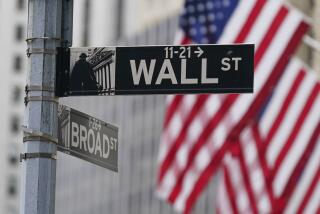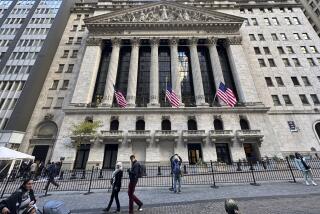In China, a Giant Statistics Problem
- Share via
Call it No. 6 -- with an asterisk.
Late last year, China proclaimed itself the world’s sixth-largest economy, edging out Italy. That proud moment wasn’t triggered by surging exports of textiles, toys and cellphones. The government simply made a “statistical revision,” boosting its 2004 gross domestic product by $278 billion, a sum larger than the entire economy of Austria.
That startling announcement, boosting the previous year’s GDP in one stroke by 16% to nearly $2 trillion, was a reminder of just how unreliable China’s economic numbers can be.
The lack of trustworthy data is a frustrating fact of life for investors, economists and government officials trying to ferret out what’s really happening in the bank vaults and boardrooms of the fastest-growing economy -- which, by the end of 2005, had risen to No. 4 in the world.
This week Ernst & Young discovered how perilous Chinese number crunching can be. Citing fresh research, the respected American consulting firm retracted a recent report that said the country’s banks were burdened by bad loans totaling $911 billion, a worrisome increase from previous estimates of $300 billion to $600 billion.
With such issues in mind, Santa Monica-based Milken Institute and Xinhua Finance Ltd., a Chinese financial news and information service, hope to clear up some of this numerical mumbo jumbo.
They have joined forces to publish eight Chinese economic indicators that will measure such things as the soundness of the banking system, the performance of initial public stock offerings, Beijing’s compliance with global trade commitments and adherence to international standards of corporate governance.
Five of the indicators will appear this fall and will be available free from Xinhua Finance, a Shanghai firm affiliated with the government’s official news organization, Xinhua, or New China, News Agency. The underlying data used to prepare the indexes will be offered for sale.
The reasons for China’s numerical imprecision are many. China’s rapid economic growth has eclipsed the government’s data-collection resources. Local and provincial officials may falsify economic data to hide corruption or poor management. The publication of some data, such as the solvency of large banks, could also be politically risky.
China also is in the process of transitioning from Mao-era number crunching. The government attributed last year’s “statistical revision” of the 2004 GDP to accounting measures that had vastly undercounted services such as real estate and banking, according to the government.
Given that history, China experts applaud the MilkenXinhua effort to unearth more accurate and timely economic information. But they voice skepticism that the project can deliver the promised goods, given the problems of extracting such data from reluctant government agencies or corporations.
“Maybe just by the act of trying to make these indexes, they will be able to pull more information out,” said James McGregor, author of “One Billion Customers.” “But statistically at first, these indexes will be an adventure.”
McGregor knows that turf. He was the head of Dow Jones & Co.’s China operation in 1996, when Xinhua News Agency launched a two-year effort, ultimately unsuccessful, to wrest control over foreign financial news operations and the profitable businesses they had built in China.
Fredy Bush, chief executive of Xinhua Finance, acknowledged that getting accurate data would be challenging.
But she said her organization, often described as the Bloomberg of China, has a large network of well-connected journalists gathering information. In addition, Bush said, the company has access to “some proprietary information” because of its close ties to the government.
Bush dismissed concerns that her firm’s connections to Xinhua News -- which holds a stake of about 3% -- posed a threat to her company’s independence. She said no one from the government had ever tried to quash a negative report on an economic policy or a prominent company.
“People tend to be a lot more negative about China than the reality of our business has shown,” said Bush, a Utah native who was in Los Angeles recently for a Milken investor conference.
China has a lot to gain by opening up its books, said Joel Kurtzman, a Milken Institute senior fellow involved in the project.
In 2001, the former senior partner at PricewaterhouseCoopers helped develop the opacity index, a widely quoted measure that tracks the cost of global capital. He says research demonstrates that greater transparency can reduce investor risk and lower the cost of capital.
“We’re not counting up missiles or warheads,” said Kurtzman, chairman of Kurtzman Group of Concord, Mass. “We’re trying to determine whether or not companies are abiding by international accounting standards, or whether or not shareholders have the right to vote proxies. I would imagine these are of real interest to the [Chinese] government.”
China has come a long way from the days of Mao Tse-tung, when economic information was “both a secret and politically driven” and local officials routinely inflated production statistics to curry favor with Beijing, said Robert Kapp, a China historian and former president of the U.S.-China Business Council.
The Chinese government still maintains a tight grip on information that is politically sensitive, such as the inner workings of the Communist Party or the crackdown on the spiritual movement Falun Gong. But Kapp said China’s present leadership recognized that accurate economic statistics were crucial to building global confidence and attracting investment.
“The problem is always the gap between intent at the highest level of policymaking and execution on the ground,” Kapp said.
Getting reliable information about China’s publicly listed companies will be particularly difficult because the government is still the majority shareholder in many of the leading businesses, said Charles Wolf, a China expert at Rand Corp. in Santa Monica. He said the government was unlikely to divulge information on issues such as employee wages and compensation.
“Their objectives in China are not predominantly enhancing shareholder value,” he said. “Their objectives include other things, like maintaining employment or maintaining the turf of provincial cadres and the party structure.”
*
(BEGIN TEXT OF INFOBOX)
Past imperfect
When China revised its 2004 GDP numbers last year, it bumped Italy as the sixth-largest economy. China has since risen to No. 4.
(2004 GDP, in trillions)
*--* U.S. $11.7 Japan 4.6 Germany 2.8 Britain 2.1 France 2.0 China 1.9 Italy 1.7 Spain 1.0 Canada 0.99 Mexico 0.68
*--*
Source: International Monetary Fund
More to Read
Inside the business of entertainment
The Wide Shot brings you news, analysis and insights on everything from streaming wars to production — and what it all means for the future.
You may occasionally receive promotional content from the Los Angeles Times.










